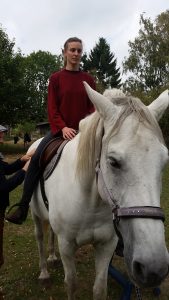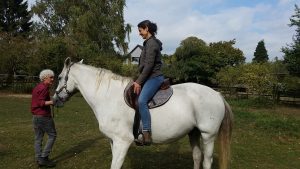thoughts and experiences of students and trainees
Final thesis of the student Bille Dau (2024): “Beyond Back Pain”
You can download the final thesis as a PDF-Datei file.
Adrien D.(2020):
- Thank you Jörg for opening my mind on a new and exciting world! After only about 10 lessons, the technique had such a profound impact on me on various levels. The biggest of all most likely is my self-confidence: I never would have expected that adopting a better posture would make such an impact on this area. Not only this, it also led to a strong sense of well-being, relaxation and optimism that led me to be much more adventurous, pro-active and confident both in my daily activities and my interactions with others. I cannot imagine stopping practicing until I’ve assimilated this technique, and the philosophy around, enough to enjoy its life-changing benefits for the rest of my life!

Final thesis of the student Teresa Wiesehöfer, 2012: “Wahrnehmung und Aufmerksamkeit in der Alexandertechnik”:
You can download the final thesis as a PDF-Datei file.
Ingrid Handwerk, 13.3.2006:
“The Alexander technique leads to an intense self-encounter. When I perceive tension and the release of tension, consciously let go and allow something to happen, that gives me a sense of inner space and freedom, a liberated space. To experience this physically is impressive – it is comparable on the level of the mind with the moment of inhibition before I react to something and act, with which I suspend immediate judgement, with the moment of silence before I speak. After practicing the Alexander Technique I feel lighter, more balanced, more in contact with myself – it does me good!
“Although there is no time for stopping before you act, some day there will be no more time at all if we do not stop now.” (Christa Wolf)”
Iris, musician:
“Sitting was a problem for me. The Alexander Technique has shown me that sitting can be a pleasurable activity. But in the same way any other familiar position or movement can be questioned. This process of renewing leads to a very enjoyable condition, to the feeling of being rather than representing someone. It is good to experience that gravity does not necessarily prevent us from being light. After a sudden hearing loss on one side, the Alexander Technique helped me a lot. It is a very good way to become calm and to let my thoughts rest in myself rather than to be projected onto an external subject. To perceive my physical self-consciously and to relate the different parts of my body to each other with the help of a teacher was new for me. Very soon I was able to regain the symmetry of my hearing.”
Berengar Schmidt, musician and student at the Alexander-Technik Schule, 25.5.06:
“I have been a student in the teacher training class since August 2005. The biggest effect for me so far has been that my strong habit of getting into endless inner discussions about anything and everything has transformed itself: more and more thinking is becoming a well-integrated tool instead of a prison. To „know where one´s head is“ seems to have considerable consequence for any kind of activity.”
Katharina Klitzing, carpenter, Student at Alexander-Technik Schule, 30.5.2006:
“I began studying the Alexander Technique because of chronic pain in my shoulder that limits my everyday activities considerably. The Alexander Technique helps me to find a different, more constructive way of dealing with the pain, and gives me hope that substantial and lasting improvement are possible. I am becoming more aware of my physical self, especially concerning the way in which I „use“ myself. I am learning to recognize faulty movement patterns and to allow them to become more appropriate by applying the principles suggested by F.M. Alexander. I enjoy this work. Sometimes it seems like hard work. The work challenges me to become aware, more and more, of my scope of action with respect to an improvement of the overall coordination of my organism. I work on connecting my thoughts with the body and with muscular activity in such a way that movements can take place with an appropriate amount of effort. Learning to do less in activity: until I have experienced what it is like to stop doing what is „too much“, I can only have an image of the effect it will have. When I actually experience it and am „in“ the effect, the reality surpasses the image. This is a new and astonishing experience each time it happens. Pain becomes a more mobile and more accessible phenomenon. The work in itself contains solutions. I like the calm and open atmosphere in the training course. There is a lot of space for us students, for teachers, for guests and for a wide range of experiences.”
Annette Jahn, Berlin, 22.3.2006:
“Dear Jörg,
I enjoyed the VHS course and got a good impression. I really understood something. On Monday, I was very relaxed and felt as though I were more closely connected to my periphery, closer to my contours, and my overall direction was clearer, I felt more open. The sentence about the free neck, the head and the long and wide back kept going through my mind. I´m sitting at my desk and it´s no longer „Oh no, I´m so collapsed again, instead a curious question: what am I really doing? So first of all, staying conscious and asking myself – am I comfortable like this, am I contracting somewhere, am I tense, using too much effort or pushing myself somewhere? I have learned not to change something actively, to make it fit to a preconceived ideal; instead to stop doing what is too much, too effortful. That feels good, but will definitely need to be refreshed and to be gone into in more depth. So you will be seeing me again!
See you soon.”
Thomas Hohler, student at UdK (university of fine and performing arts), Musical department:
“Hello Jörg,
thank you again for the wonderful workshop, which is still on our minds. Even subway rides aren´t boring anymore, since there is always something one can pay attention to…
I hope there will be an opportunity to refresh or go more deeply into the things we learned in the workshop.
Unfortunately our schedule is so full that most of us do not have the time to continue learning at your school…but you have really given us a lot of material with which we can work and which we can work on applying!
Greetings!”
“here is a short report on our workshop:
The Alexander Technique workshop gave us a first impression of what the Alexander Technique is and how it can be useful. In the beginning, I was a little worried about what would await me. I hoped I would not be confronted with esoteric techniques or with questions of belief (something I would be expected to believe in). My apprehension was unnecessary. In my view the Alexander technique is simply involved with what our body and our perception are telling us or more precisely, with what our perceptions and our body are. For after just a few simple exercises (yes, standing up and sitting down can be considered as an „exercise“) performed in the way suggested – I became aware that our body offers many more possibilities of perception than I had been „ready“ to acknowledge until then. In this way, I learned that the relationship between our body (motor system) and our mind (will) must be developed or rather refined. I also found it almost shocking, although not really threatening to see how much of what our body does is automatic. Even if we become aware of these patterns of movement or behavior, it is very difficult to stop or inhibit them. For example, an impulse which the body receives to sit down is executed immediately in a routine way. But the routine way is not always the right way, especially when considering the amount of effort and energy that are exerted. It really is very difficult to express my experiences in words, because we are not used to listening to our body, nor to giving the body orders through our thinking. We are not used to communicating about these things, so we can only describe what they feel like. Everyone feels something when they think of their right hand. The hand was there before, but through my thinking, it begins to tingle, to feel heavy or even to feel light…etc – one really begins to feel it. That in itself is proof to me that the Alexander Technique enables us to learn a lot about our body in many ways – about our movement possibilities, tension, posture, spatial orientation while dancing, the sense of space while acting or singing. It begins with becoming aware of very small things, and yet has such a big effect…”
Adrian, school teacher:
“I experience moments in which the most everyday movements suddenly become easy, effortless, simple and thus completely new. I am developing a new fascination for my own possibilities of development. Wonderful.”
A musician and teacher of the Alexander Technique:
I work with the Alexander Technique because it helps me to consistently attain a higher degree of physical and mental calmness and clarity.
The principle of inhibition fascinates me as the possibility of not always falling into the same traps of having real freedom of decision.
Amongst other things, I also consider the Alexander Technique as a private preventive health care. It has helped me to get rid of strong physical pain. Aside from that I have learned a lot about my body and my thinking.


